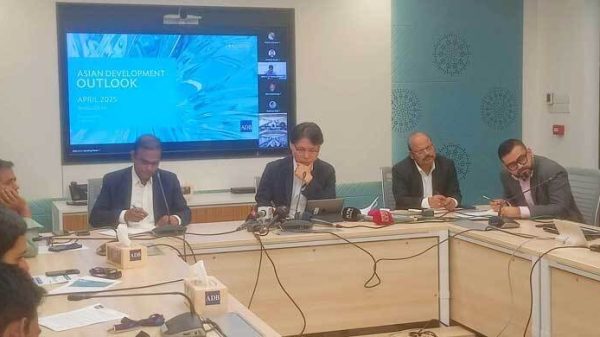ADB forecasts GDP growth to slow to 3.9%, inflation to rise

- Update Time : Wednesday, 9 April, 2025, 03:53 pm
- 23 Time View

Online Desk : The Asian Development Bank (ADB) has revised its GDP growth forecast for Bangladesh, projecting a slowdown to 3.9 per cent in the current fiscal year (2025). At the same time, inflation is expected to rise from 9.7 per cent to 10.2 per cent, according to the agency’s latest report. This updated outlook was announced during a press conference at the ADB’s Dhaka office in Agargaon on Wednesday (April 9). The briefing highlighted key findings from the ‘Asian Development Outlook (ADO) April 2025’ report, which attributes the downward revision to ongoing economic challenges.
Revised forecasts and economic outlook : While economic growth is expected to slow to 3.9 per cent in FY 2025, the ADB anticipates a rebound in the following fiscal year, with growth projected to reach 5.1 per cent in FY 2026. Despite robust performance in Bangladesh’s garment exports—a critical driver of the economy—growth is expected to decelerate due to weakening domestic demand. Factors such as political instability, natural disaster risks, industrial disruptions, and persistently high inflation are cited as key contributors to this slowdown. For context, Bangladesh’s GDP growth stood at 4.2 per cent in FY 2024.
ADB recommendations for economic resilience : Speaking at the press conference, Hoe Yun Jeong, ADB Country Director for Bangladesh, emphasised that despite external and internal adversities, Bangladesh’s economy remains resilient. He stressed the importance of implementing structural reforms to strengthen this resilience. Jeong outlined several recommendations to accelerate growth, create jobs, and enhance competitiveness:
– Economic Diversification: Bangladesh should reduce its reliance on the garment sector by fostering private sector development in other industries.
– Infrastructure Development: Building resilient infrastructure is crucial to withstand natural disasters and support long-term growth.
– Energy Security: Improving energy security will help stabilize industrial operations and attract investment.
– Financial Governance: Strengthening governance in the financial sector will enhance investor confidence and economic stability.
– Foreign Investment: Attracting foreign direct investment (FDI) is vital for diversifying the economy and driving innovation.
Inflationary pressures and trade dynamics : The ADB report highlights that inflationary pressures are likely to intensify due to several factors, including:
– Increased competition in wholesale markets.
– Inadequate market information and supply chain constraints.
– Currency depreciation, which raises import costs.
On a positive note, the trade deficit is expected to narrow, supported by rising remittances. As a result, the current account deficit is projected to decline from 1.4 per cent of GDP in FY 2024 to 0.9 per cent of GDP in FY 2025.
A call for structural reforms : The ADB urged Bangladesh to address structural weaknesses to ensure sustainable growth. By diversifying its economy, improving infrastructure, and enhancing governance, Bangladesh can mitigate vulnerabilities and achieve higher levels of prosperity. As the country navigates these challenges, the ADB remains optimistic about Bangladesh’s potential to overcome current headwinds and emerge stronger in the coming years.










